Related Research Articles

Aaron Burr Jr. was an American politician, businessman, lawyer, and Founding Father who served as the third vice president of the United States from 1801 to 1805 during Thomas Jefferson's first presidential term. He founded the Manhattan Company on September 1, 1799. Burr is remembered for his famous personal and political conflict with Alexander Hamilton, which culminated in the Burr–Hamilton duel in Weehawken, New Jersey on July 11, 1804. Burr mortally wounded Hamilton, who died from his wounds the following day.

Samuel Jones Tilden was an American politician who served as the 25th governor of New York and was the Democratic nominee in the disputed 1876 United States presidential election.

Levi Parsons Morton was the 22nd vice president of the United States from 1889 to 1893. He also served as United States ambassador to France, as a U.S. representative from New York, and as the 31st governor of New York.
Sarah "Sally" Hemings was an enslaved woman with one-quarter African ancestry owned by president of the United States Thomas Jefferson, one of many he inherited from his father-in-law, John Wayles.

John Milton was governor of Florida through most of the American Civil War. A lawyer who served in the Florida Legislature, he supported the secession of Florida from the Union and became governor in October 1861. In that post, he turned the state into a major supplier of food for the Confederacy. In his final message to the state legislature as the war was ending, he declared that death would be preferable to reunion with the North. When he killed himself, his son Jefferson Davis Milton was a toddler.
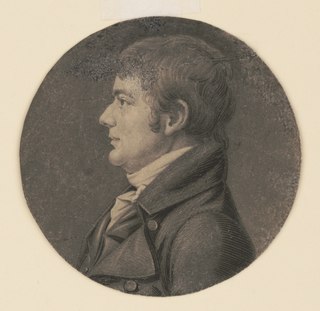
John Wayles Eppes was an American lawyer and politician. He represented Virginia in the U.S. House of Representatives from 1803 to 1811 and again from 1813 to 1815. He also served in the U.S. Senate (1817–1819). His positions in Congress occurred after he served in the Virginia House of Delegates representing Chesterfield County (1801–1803).
Thomas Taber II was an American farmer, businessman, and politician from New York. He was most notable for his service as a member of the New York State Assembly in 1826 and as a member of the United States House of Representatives from 1828 to 1829.

Francis Wayles Eppes was a planter and slave owner from Virginia who became a cotton planter in the Florida Territory and later civic leader in Tallahassee and surrounding Leon County, Florida. After reaching legal age and marrying, Eppes operated the Poplar Forest plantation which his grandfather President Thomas Jefferson had established in Bedford County, Virginia, which he inherited. However, in 1829 he moved with his family to near Tallahassee, Florida. Long interested in education, in 1856 Eppes donated land and money to designate a school in Tallahassee as one of the first two state-supported seminaries, now known as Florida State University. He served as president of its board of trustees for eight years.

The Francis Eppes Plantation was a cotton plantation of 1,920 acres (8 km2) situated in east-central Leon County, Florida, United States and established by Francis W. Eppes in 1829.
Mary Jefferson Eppes, known as Polly in childhood and Maria as an adult, was the younger of Thomas Jefferson's two daughters with his wife who survived beyond the age of 3. She married a first cousin, John Wayles Eppes, and had three children with him. Only their son Francis W. Eppes survived childhood. Maria died months after childbirth.
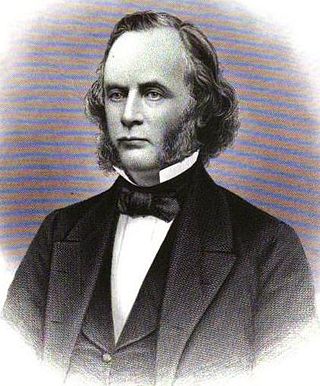
David Allen Smalley was a United States district judge of the United States District Court for the District of Vermont.
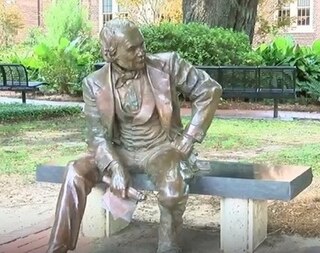
The Eppes Statue is a monument of Francis W. Eppes that is located in Tallahassee, Florida. The bronze sculpture sits in front of the Westcott Building on Florida State University's campus. It was commissioned by FSU president Sandy D'Alemberte to honor one of Florida State University's founders. This monument was created by sculptor Edward Jonas and was unveiled to the public eye on January 24, 2002.
Charles Louis Cammann Gifford was an American attorney and politician who served in the New Jersey General Assembly and the New Jersey Senate. Gifford was President of the Senate in 1860.
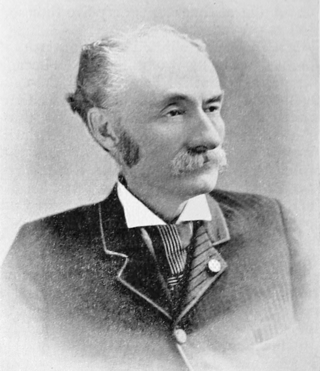
Marshall Harvey Twitchell was a teacher, officer in the Union Army, and businessman. Originally from Vermont, he became a prominent political figure in Louisiana's post-war Reconstruction, including two terms as a Republican member of the Louisiana State Senate. He was seriously wounded during the Civil War and was shot multiple times in an assassination attempt by white supremacists after the war. He returned north, served as a diplomat in Canada, and wrote a memoir.

The Jefferson-Eppes Trophy is an American college football trophy given to the winner of irregularly played games between the Florida State Seminoles of Florida State University and the Virginia Cavaliers of the University of Virginia. The trophy was created on the suggestion of former FSU President Sandy D'Alemberte, after Virginia became the first ACC program to defeat Florida State on November 2, 1995. To that point, the Seminoles had run up a perfect 29–0 record through their first 3½ years of Atlantic Coast Conference play.
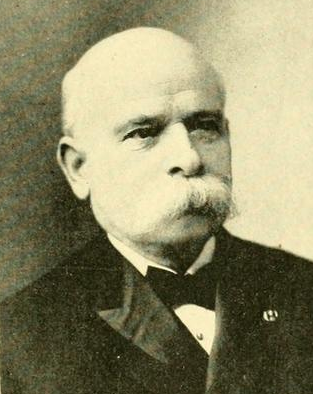
Rufus Albertson Soule Sr. was a politician in Massachusetts. He served in the 1901 Massachusetts legislature and the 1902 Massachusetts legislature as president of the senate both years. Winthrop M. Crane was governor.
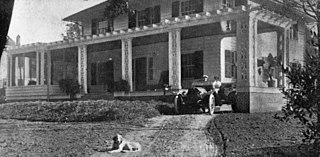
Theodore Tiffany Turnbull was an American lawyer, cotton plantation owner, and state legislator in Florida from 1915 until 1929. He served as Speaker Pro Tempore of the Florida House of Representatives and President of the Florida Senate.
Daniel G. McLean was an American lawyer and politician in Florida. He signed the first Florida Constitution in 1838 at St. Joseph, served in the Florida Senate including as President of the Florida Senate, served as Speaker of the Florida Territory's legislature, and was Grandmaster of the Masons. He was a Whig. He lived in Euchee Anna.
Thomas Jefferson Pitchford Sr. was a state legislator in North Carolina. He represented Warren County, North Carolina in the North Carolina House of Representatives and for several terms in the North Carolina Senate. He was a Democrat. He proposed a bill to make it possible to enslave free blacks.
References
- ↑ The Florida Handbook, 1999-2000. Peninsular Books. August 29, 1999. ISBN 9780961600075 – via Google Books.
- ↑ Senate, Florida Legislature (October 29, 1860). "Journal of the Proceedings of the Senate of the General Assembly of the State of Florida at the ... Session ..." The State – via Google Books.
- ↑ Cash, William Thomas (October 29, 1936). "History of the Democratic Party in Florida: Including Biographical Sketches of Prominent Florida Democrats". Florida Democratic historical foundation – via Google Books.
- ↑ Society, Florida Historical (October 29, 1970). "The Florida Historical Quarterly". Florida Historical Society – via Google Books.
- 1 2 Suhrer, Andrew B. (August 6, 2008). The Flying Dutchmen. Author House. ISBN 9781452037523 – via Google Books.
